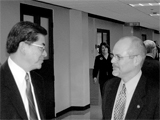House commmittee hears from León

Rep. Kevin Wilson (R-Neosho) on right and university President Julio León at left catch up in hallway oustide the House hearing romom after León´s presentation on Tuesday. Funding allocations for Southern are expected to remain stable.
JEFFERSON CITY – Missouri legislators need to call on the educational brain trust to help the state economics, said Gregory Fitch, Commissioner of the Coordinating Board for Higher Education.
“The Coordinating Board for Higher Education at this particular point in time has not done a lot,” Fitch said.
Fitch spoke at the beginning of a day of presentations by Missouri public four-year institutions of higher education to the House Education Committee.
Representatives listened as school presidents and representatives spoke on behalf of their respective educational institutions.
Affordability of education was a common theme as speakers spoke of the hardships a tight fiscal budget has on student tuition and fees.
“In the area of affordability, we went from a D+ in 2000 to an F this year,” Fitch said. “We are going to respond to this area.”
There are 10 public four-years institutions of higher education in Missouri and each has a different appearance and function, much like the fingers of a hand, he said.
“If you take one and tap on the table, you don’t hear much … if you put them together in a group and they can grasp any issue or circumstances or problem you have and help solve that problem,” Fitch said.
Presentations of the varied institutions were designed to help the Committee solve the issues facing the Higher Education department and recognize the accomplishments and needs of each individual school.
MSSU – Joplin
University President Julio León’s presentation focused on Southern’s international mission and low cost.
Southern’s international mission stems from a legislative effort in 1995 to define higher education institutions.
“For the past eight years, we have been developing different types of programs that will benefit our students and make them competitive in this global economy of today,” León said.
The international mission is focused on providing opportunities for Southern students to travel and study abroad.
“We do not engage in the recruitment of international students,” León said.
The American Council of Education has selected Southern as one of eight institutions across the country as part of a program call “Promising Practices,” he said.
“It demonstrates that our institution, even though we are in the far southwestern corner of the state, we have chosen to look to the rest of the world in terms of what is needed by our students … when they graduate,” León said.
Future internationally themed semesters include Mexico, France and China.
Southern’s has been Missouri’s lowest publicly-funded state higher education institution on a per student basis over the past 20 years, León said.
“We have managed to be successful and do what we are supposed to do with what we are given,” he said.
Several steps have been taken to keep funding and costs low, both for the University and for the students.
In 2000, Southern reduced the number of hours necessary for graduation from 128 to 124. Within five years, the necessary hours is expected to drop to 120.
“Our Board of Governors has always made it a priority to remain as low as possible with regard to tuition and fees,” León said. “Over the last 20 years, Missouri Southern has charged the lowest tuition of any state public four-year college.”
In an interview following his presentation, León answered questions concerning Southern’s financial picture for capital improvement and staff recruitment.
The new $10 million dollar health science building was approved before the recession began and remains as part of $180 capital buildings package waiting until funding becomes available.
The health science building is item eight or nine on the buildings package.
Several full professor positions on campus remain open because of a lack of funding.
“We feel very fortunate, really, to be at the same level as last year because other state agencies are being cut 20 percent,” León said. “I think [funding issues] will continue like this for at least two more years.”
The social sciences department is short five full professors this semester, said Dr. Richard Miller, social science department head.
There are three empty spots and two spots are filled this year with instructors on one-year contracts.
Candidate searches are still being conducted to fill the empty professor slots, contingent upon the department receiving additional funding.
Your donation will support the student journalists of Missouri Southern State University. Your contribution will allow us to purchase equipment and cover our annual website hosting costs.















